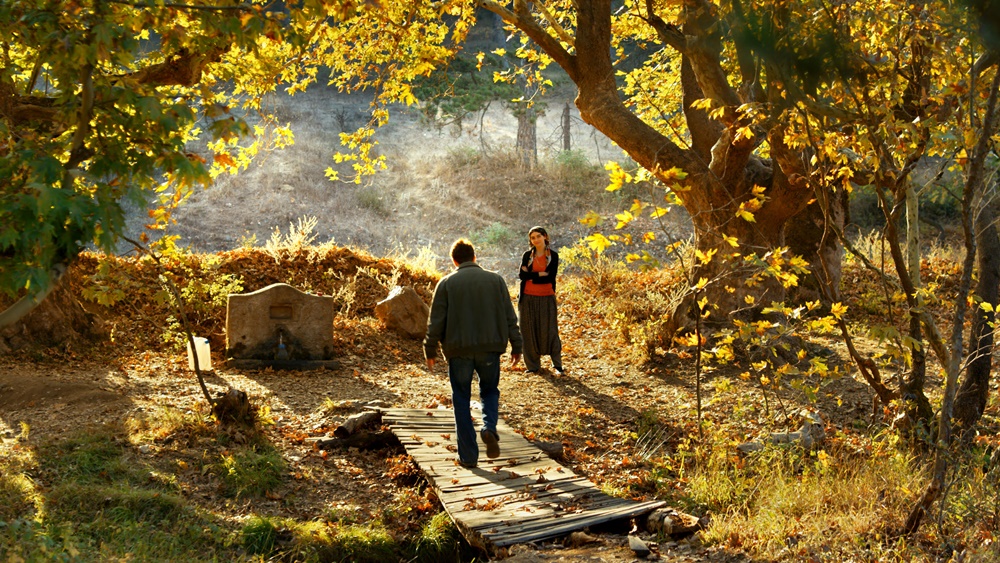Turkish master Ceylan continues his extraordinarily consistent form in this dialogue-heavy three-hour drama with echoes of ‘Winter Sleep’ and ‘Anatolia’.
Dir. Nuri Bilge Ceylan
2018 | Turkey | Drama | 188 mins | 2.39:1 | Turkish
PG13 (passed clean) for some coarse language
Cast: Dogu Demirkol, Murat Cemcir, Bennu Yildirimlar, Hazar Ergüçlü, Serkan Keskin
Plot: An aspiring writer returns to his native village, where his father’s debts catch up to him.
Awards: Nom. for Palme d’Or (Cannes)
International Sales: Memento Films International
Accessibility Index
Subject Matter: Moderate
Narrative Style: Complex/Dense
Pace: Slow
Audience Type: General Arthouse

(Reviewed at Middle East Film Festival ’19)
Spoilers: No
One could make a case for The Wild Pear Tree to be part of a loose trilogy of ‘elemental epics’ by Turkish master Nuri Bilge Ceylan, alongside Once Upon a Time in Anatolia (2011) and Winter Sleep (2014), centering on the beautiful natural landscapes, and sometimes, erratic weather conditions, of Turkey’s countryside.
While Anatolia worked primarily as an arthouse investigative procedural, Winter Sleep is arguably the most dialogue-heavy in his oeuvre. We see echoes of each in his latest film (there’s even a sublime homage to Anatolia’s opening scene), which sees one of world cinema’s true modern masters continuing his extraordinarily consistent form.
The Wild Pear Tree is a decidedly more ‘urban’ type film centering on a young man, Sinan, who has since graduated and returning home to his family’s apartment.
He has dreams of becoming a writer, but discovers his father’s debt issues could be insurmountable. His mother and sister, affected by their breadwinner’s lackadaisical attitude, can’t do much to effect any change.
“Someone once called time a silent saw. You never know what it’ll do to us.”
The Wild Pear Tree is as much about familial problems as it is about the broader sociopolitical contexts affecting modern Turkey, the latter coming to the fore in what is now Ceylan’s auteurist trademark—long, extended conversations that like falling snow or rustling leaves seem never-ending yet mesmerising to behold.
Ceylan has a gift for dialogue with a well that never seems to run dry, and it is one of the reasons his films may be long, but don’t feel its length (or perhaps more accurately, earns its length).
Ceylan also uses Bach’s ‘Passacaglia and Fugue in C minor, BWV 582’ quite extensively as the film’s leitmotif, occurring at key inflection points in the dense narrative. One could make a case for The Wild Pear Tree to be his most accessible of the trio of lengthy ruminations about life and living.
Fascinatingly, his focus on Sinan might resonate with viewers at the crossroads of their lives—do we follow our dreams? Can we have ambitions? But do we also struggle to find our own identity?
A conversation related to writers’ brief biographies as seen at the back of a book or in a conference brochure, and who actually pens them if not the writers themselves, sparks questions about one’s self-image in public. But identity is so much more than just self-image; is it not the (banal) root of our existence?
This brings us to a philosophical pitstop: could it ever be possible to shed the identity in which we are born into in order to, say, progress? The Wild Pear Tree suggests so much and makes its musings count, culminating in arguably the finest final stretch of any film from 2018.
Grade: A
Trailer:
Music:












[…] Director – THE WILD PEAR TREE for Nuri Bilge Ceylan (Runner-up: SUSPIRIA for Luca […]
LikeLike
[…] Dry Grasses should please fans and like the novelistic Winter Sleep (2014) and The Wild Pear Tree (2018), the three-hour-plus runtime ticks by effortlessly, a slow cinema page-turner if you […]
LikeLike